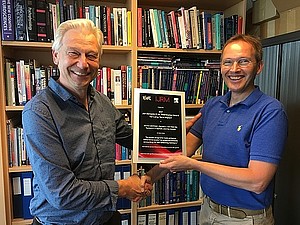Impact award for research paper on loyalty programmes

A paper co-authored by Professor Ale Smidts from Rotterdam School of Management, Erasmus University (RSM) and ERIM Fellow won the 2017 Jan-Benedict E.M. Steenkamp Award for Long-Term Impact. The paper explores if loyalty programmes really enhance behavioural loyalty. The European Marketing Academy (EMAC) and the International Journal of Research in Marketing (IJRM) announced the award at the EMAC Conference in Groningen in May 2017.
The paper Do loyalty programs really enhance behavioral loyalty? An empirical analysis accounting for self-selecting members was written by Jorna Leenheer, Harald van Heerde, Tammo Bijmolt and Ale Smidts and published in the International Journal of Research in Marketing in 2007. At the time, the paper already won the 2007 IJRM Best Paper Award. The Steenkamp award was handed to him by Professor Gerrit van Bruggen, professor of marketing at RSM and currently president of EMAC.
Share-of-wallet
One of the pressing issues in marketing that has significant managerial implications is whether loyalty programmes work. Loyalty programme members may have a much higher share-of-wallet at the firm with the loyalty programme than non-members have, but this does not necessarily imply that loyalty programmes are effective. Loyal customers may select themselves to become members in order to benefit from the programme. As this implies that programme membership is endogenous, the researchers estimated models for both the membership decision and for the effect of membership on share-of-wallet, as measure of behavioural loyalty.
Grocery retailing
They used panel data from a representative sample of Dutch households who reported their loyalty programme memberships for all seven loyalty programmes in grocery retailing as well as their expenditures at each of the 20 major supermarket chains. They find a small positive yet significant effect of loyalty programme membership on share-of-wallet. This effect is seven times smaller than is suggested by a naïve model that ignores the endogeneity of programme membership. The predictive validity of the proposed model is much better than for the naïve model.
Results show that creating a loyalty programme membership is a crucial step to enhance share-of-wallet, and the paper provides guidelines on how to achieve this.
Jan-Benedict E.M. Steenkamp Award for Long-Term Impact
The Jan-Benedict E.M. Steenkamp Award for Long-Term Impact is given annually to papers published in IJRM in recognition of their exceptional contributions in academic marketing research by demonstrating long-term impact. A four-member award committee, formed by IJRM editor Roland Rust, managed the nomination and selection procedure this year. The committee is comprised of: chairman Prof. Russell Winer (New York University), Prof. Christian Homburg (University of Mannheim), Mario Pandelaere (Ghent University and Virginia Tech), and Prof. Andrew Stephen (University of Oxford). These four senior editors represent the three key domains of consumer behaviour, strategy and marketing. The paper was the unanimous choice by the committee for the combination of the importance of the problem examined, the creativity of the modelling, the combination of several interesting datasets, and the citation impact the work has had on other marketing scholars.


